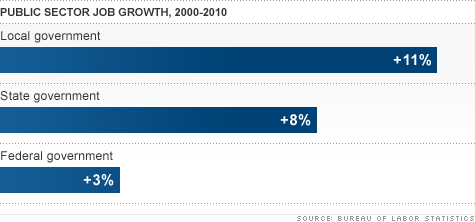Search News
 After a decade of growth, local governments are under intense pressure to cut back.
After a decade of growth, local governments are under intense pressure to cut back.NEW YORK (Fortune) -- Cities and other municipalities are in a world of budgetary hurt. Is a wave of bankruptcies on the way?
The odds are against it, given the rules that restrict who can file for protection from creditors under Chapter 9 of the federal bankruptcy code. States, for instance, can't file, while in many cities, towns and other government bodies can seek bankruptcy only in limited circumstances.
Yet with Greece's fiscal problems blaring from the headlines and governments across the United States bracing for another round of draconian cuts, municipal bond investors have been keeping an eye out for a rare event: a default on bonds issued by a local government.
"I've been investing in muni bonds for 25 years, and I have never had to focus on this side of it until now," said Matthew Dalton, who runs muni bond investor Belle Haven Investments in White Plains, N.Y. "We're keeping an eye out for something that comes out of left field."
Harrisburg, Pa., could be in the ballpark. A top city official said this week that the capital of the sixth-most-populous state may file for protection from its creditors as soon as March 1.
The city, straining under a $282 million mountain of debt issued earlier this decade to pay for a trash incinerator, could also take state aid, as cities including Pittsburgh have.
The bigger issue though is what happens in California, which as the epicenter of the housing bust is chock full of distressed municipalities -- including the Bay Area city of Vallejo, which filed in May 2008 for bankruptcy.
The Vallejo case attracted notice because city managers said the filing would help them slash their payroll for police officers and firemen. The idea of purging costly labor contracts through the court system is sure to appeal to some municipal managers at a time of tumbling tax collections and soaring costs.
Vallejo won a key court victory last March, when a federal bankruptcy judge ruled the city could break its union contracts. The ruling is being appealed, but if it is upheld others might follow in Vallejo's footsteps.
"They might not be at the crisis point we're in today, but sooner or later they're going to get there," Vallejo Mayor Osby Davis said at the time of the bankruptcy filing.
Since then, however, no other municipalities have filed for bankruptcy, even as unemployment has skyrocketed and municipal finances have been strained further.
That's partly because the Vallejo case is still under appeal, but the flow of stimulus dollars to states and municipalities may also have helped some cash-strapped local governments. Also, it's become clear bankruptcy is no silver bullet.
"I don't see too many more bankruptcies down the road," said Tim Yeung, a public law attorney with Renne Sloan Holtzman Sakai LLP in Sacramento, Calif. "As we're finding out in Vallejo, bankruptcy is very expensive, not that quick, and the courts are still loath to entirely throw out union contracts."
While Vallejo has imposed some cutbacks on workers and renegotiated some contracts, it's fair to wonder if it was it worth it.
The city, which has cut its police force by a third over five years, this week asked the county to help patrol its streets after a weeklong crime spree featuring "two homicides, a knife attack that injured three people, the shooting of an ice-cream vendor and a mob assault on a city employee," according to the San Francisco Chronicle.
Another shortcoming of bankruptcy is that it doesn't address retiree health care benefits -- which are also a huge cost for municipal governments.
San Diego, like dozens of cities across the state, is struggling to close a big budget gap at a time when California itself is staring into the fiscal abyss. But Mayor Jerry Sanders said last month that bankruptcy advocates are engaged in little more than a "con job" that ignores long-term problems.
A bankruptcy filing could cost the city $100 million or more, according to calculations by San Diego City Attorney Jan Goldsmith.
"If you have to look to the lawyers to solve your problems, you're in trouble," he said last month in a speech to taxpayers. ![]()






| Company | Price | Change | % Change |
|---|---|---|---|
| Ford Motor Co | 8.29 | 0.05 | 0.61% |
| Advanced Micro Devic... | 54.59 | 0.70 | 1.30% |
| Cisco Systems Inc | 47.49 | -2.44 | -4.89% |
| General Electric Co | 13.00 | -0.16 | -1.22% |
| Kraft Heinz Co | 27.84 | -2.20 | -7.32% |
| Index | Last | Change | % Change |
|---|---|---|---|
| Dow | 32,627.97 | -234.33 | -0.71% |
| Nasdaq | 13,215.24 | 99.07 | 0.76% |
| S&P 500 | 3,913.10 | -2.36 | -0.06% |
| Treasuries | 1.73 | 0.00 | 0.12% |
|
Bankrupt toy retailer tells bankruptcy court it is looking at possibly reviving the Toys 'R' Us and Babies 'R' Us brands. More |
Land O'Lakes CEO Beth Ford charts her career path, from her first job to becoming the first openly gay CEO at a Fortune 500 company in an interview with CNN's Boss Files. More |
Honda and General Motors are creating a new generation of fully autonomous vehicles. More |
In 1998, Ntsiki Biyela won a scholarship to study wine making. Now she's about to launch her own brand. More |
Whether you hedge inflation or look for a return that outpaces inflation, here's how to prepare. More |